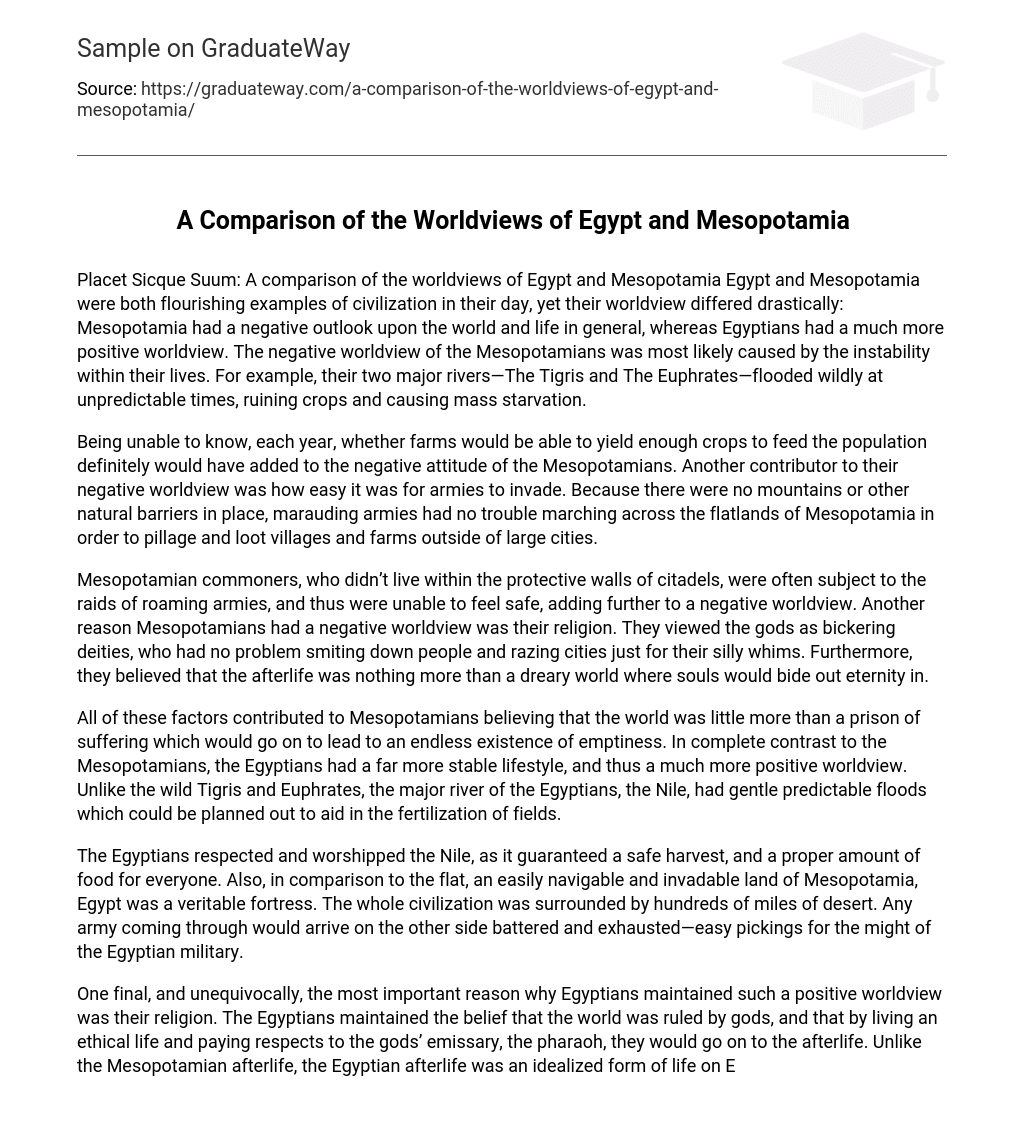Placet Sicque Suum: A comparison of the worldviews of Egypt and Mesopotamia Egypt and Mesopotamia were both flourishing examples of civilization in their day, yet their worldview differed drastically: Mesopotamia had a negative outlook upon the world and life in general, whereas Egyptians had a much more positive worldview. The negative worldview of the Mesopotamians was most likely caused by the instability within their lives. For example, their two major rivers—The Tigris and The Euphrates—flooded wildly at unpredictable times, ruining crops and causing mass starvation.
Being unable to know, each year, whether farms would be able to yield enough crops to feed the population definitely would have added to the negative attitude of the Mesopotamians. Another contributor to their negative worldview was how easy it was for armies to invade. Because there were no mountains or other natural barriers in place, marauding armies had no trouble marching across the flatlands of Mesopotamia in order to pillage and loot villages and farms outside of large cities.
Mesopotamian commoners, who didn’t live within the protective walls of citadels, were often subject to the raids of roaming armies, and thus were unable to feel safe, adding further to a negative worldview. Another reason Mesopotamians had a negative worldview was their religion. They viewed the gods as bickering deities, who had no problem smiting down people and razing cities just for their silly whims. Furthermore, they believed that the afterlife was nothing more than a dreary world where souls would bide out eternity in.
All of these factors contributed to Mesopotamians believing that the world was little more than a prison of suffering which would go on to lead to an endless existence of emptiness. In complete contrast to the Mesopotamians, the Egyptians had a far more stable lifestyle, and thus a much more positive worldview. Unlike the wild Tigris and Euphrates, the major river of the Egyptians, the Nile, had gentle predictable floods which could be planned out to aid in the fertilization of fields.
The Egyptians respected and worshipped the Nile, as it guaranteed a safe harvest, and a proper amount of food for everyone. Also, in comparison to the flat, an easily navigable and invadable land of Mesopotamia, Egypt was a veritable fortress. The whole civilization was surrounded by hundreds of miles of desert. Any army coming through would arrive on the other side battered and exhausted—easy pickings for the might of the Egyptian military.
One final, and unequivocally, the most important reason why Egyptians maintained such a positive worldview was their religion. The Egyptians maintained the belief that the world was ruled by gods, and that by living an ethical life and paying respects to the gods’ emissary, the pharaoh, they would go on to the afterlife. Unlike the Mesopotamian afterlife, the Egyptian afterlife was an idealized form of life on Earth, with happiness for all who made it there.
Even small things in life translated into the Egyptian religion. For instance, they believed that the sun rising everyday was a sign that Ma’at (Order) had vanquished (Appophis) Chaos and that good would reign for the day. With such strong beliefs, it is no wonder that the Egyptians were able to maintain their positive worldview. Despite living within such proximity in time of each other, Mesopotamians and Egyptians had very different worldviews, each springing from a variety of factors in their lifestyles.





